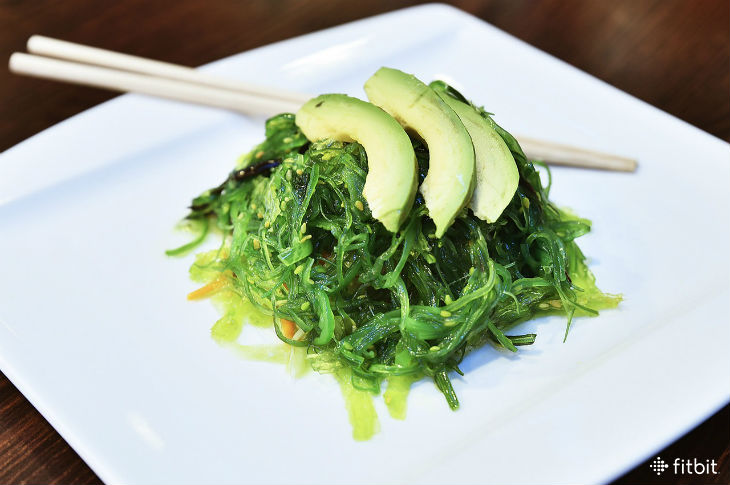
Seaweed is a form of marine plants and algae that grow in salty water. Traditionally an Asian-cuisine favorite, this sea vegetable has made its way across the oceans and become a popular ingredient in western dishes, too — you’ll see it wrapped around sushi, roasted as a kid’s snack, and served as a bright green seaweed salad. It’s unsurprising, as the delicious umami-flavored ingredient is not only versatile, but low in calories and packs a serious nutritional punch.
Humans have been foraging for seaweed for centuries, with some researchers suggesting we have seaweed to thank for our highly evolved brains. But due to potentially high arsenic and iodine levels, which come with scary cancer warnings, you need to consider your choice of seaweed and how much you’re eating.
Get the gist on this Asian staple ingredient.
Seaweed Delivers Plenty of Nutrients in Very Few Calories
By sprinkling some seaweed into your salad, you’ll be boosting your dose of disease-fighting nutrients, including essential amino acids, antioxidants, omega-3 fatty acids, vitamins, minerals, and dietary fiber. Take a look at a few of the health benefits:
- Seaweed is an excellent source of iodine, a mineral vital during pregnancy and early childhood to ensure proper growth and brain development.
- A rich source of fiber, seaweed may help you curb your appetite, reduce blood cholesterol, and control your blood sugar levels. The fiber also acts as a prebiotic or food for the good bacteria in your gut.
- Wakame seaweed, the type traditionally added to miso soup, has been shown to boost immunity and have antiviral activity, particularly against the herpes virus which is responsible for giving you cold sores.
- With its high amino acid, iron, and vitamin C content, seaweed is a nourishing addition to a vegan diet. Some varieties, like nori, also show promise in being a source of vitamin B12, however, it’s still not entirely clear whether the body can absorb vitamin B12 from seaweed.
Don’t Go Overboard
While the high levels of iodine have benefit for growing brains, consuming too much iodine can be harmful. Some kelps, a type of seaweed often consumed as a supplement, contains very high amounts of iodine, and eating too much can affect your thyroid function and possibly lead to thyroid cancer, although a recent large study on Japanse women found no association between eating natural seaweed (not taking a supplement) a few times a week and cancer risk. As iodine content can vary greatly and supplements deliver a large dose, it’s best to not go overboard on kelp..
Another type of seaweed, Hijiki, contains high levels of arsenic, a heavy metal which can act as a carcinogen in the body. For this reason, most food standards agencies around the world, including the USDA, have advised the public to avoid eating Hijiki seaweed. Hijiki is easy to spot because of its distinctive black and shredded appearance. It’s mainly added to Japanese and Korean soups and salads, but is not used to make sushi.
And don’t confuse minimally processed seaweed with its highly processed by-product, carrageenan a food additive used as a stabilizer and thickener in foods like non-dairy milks and ice-cream, which can cause tummy upsets in some people.
Seaweed is Another Way to Eat More Plants
If a superfood is something that’s packed with nutrients and comes with serious health benefits, then yes seaweed can be considered a superfood. Does this mean you should be snacking on copious amounts of seaweed or adding it to every salad? Nope. Like with all things in life, moderation is key. View seaweed as another tasty way to add more nourishing plants to your plate, along with other vegetables, fruit, whole grains, nuts, and legumes. The good news is because seaweed supplies a concentrated dose of nutrients, you only need a small amount to boost the nutritional quality of your meal. Go for natural seaweed over supplements to safely include it in small quantities, a couple of times a week as part of an overall healthy diet.
This information is for educational purposes only and is not intended as a substitute for medical diagnosis or treatment. You should not use this information to diagnose or treat a health problem or condition. Always check with your doctor before changing your diet, altering your sleep habits, taking supplements, or starting a new fitness routine.

If you have questions about a Fitbit tracker, product availability, or the status of your order, contact our Support Team or search the Fitbit Community for answers.
Please note: Comments are moderated and may not appear immediately after submission.